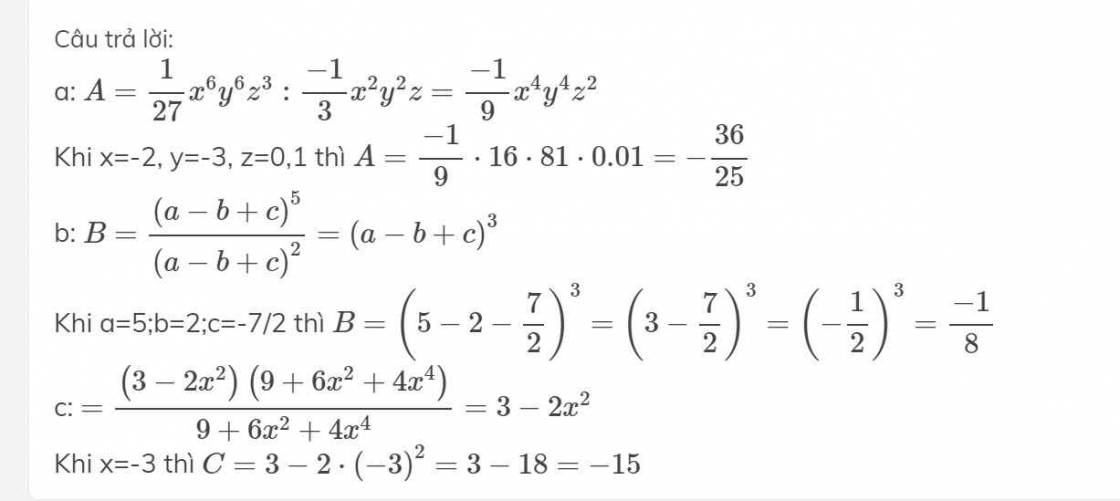Hãy nhập câu hỏi của bạn vào đây, nếu là tài khoản VIP, bạn sẽ được ưu tiên trả lời.

Vì dài quá nên mình chỉ có thể trả lời được mấy câu thôi
Bài 1:
27x3 - 8 : (6x + 9x2 +4)
= (3x - 2) (9x2 + 6x + 4) : (9x2 + 6x + 4)
= 3x - 2
Bài 3:
a, 81x4 + 4 = (9x2)2 + 36x2 + 4 - 36x2
= (9x2 + 2)2 - (6x)2
= (9x2 + 6x + 2)(9x2 - 6x + 2)
b, x2 + 8x + 15 = x2 + 3x + 5x + 15
= x(x + 3) + 5(x + 3)
= (x + 3)(x + 5)
c, x2 - x - 12 = x2 + 3x - 4x - 12
= x(x + 3) - 4(x + 3)
= (x + 3) (x - 4)
Câu 1:
(27x3 - 8) : (6x + 9x2 + 4)
= (3x - 2)(9x2 + 6x + 4) : (6x + 9x2 + 4)
= 3x - 2
Câu 2:
a) (3x - 5)(2x+ 11) - (2x + 3)(3x + 7)
= 6x2 + 33x - 10x - 55 - 6x2 - 14x - 9x - 21
= -76
⇒ đccm
b) (2x + 3)(4x2 - 6x + 9) - 2(4x3 - 1)
= 8x3 + 27 - 8x3 + 2
= 29
⇒ đccm
Câu 3:
a) 81x4 + 4
= (9x2)2 + 22
= (9x2 + 2)2 - (6x)2
= (9x2 - 6x + 2)(9x2 + 6x + 2)
b) x2 + 8x + 15
= x2 + 3x + 5x + 15
= x(x + 3) + 5(x + 3)
= (x + 3)(x + 5)
c) x2 - x - 12
= x2 - 4x + 3x - 12
= x(x - 4) + 3(x - 4)
= (x - 4)(x + 3)

Bài 1:
\(A=\left(x-y\right)\left(x^2+xy+y^2\right)+2y^3\)
\(A=x^3-y^3+2y^3\)
\(A=x^3+y^3\)
Thay \(x=\dfrac{2}{3},y=\dfrac{1}{3}\) vào A, ta có:
\(A=\left(\dfrac{2}{3}\right)^3+\left(\dfrac{1}{3}\right)^3=\dfrac{8}{27}+\dfrac{1}{27}=\dfrac{9}{27}=\dfrac{1}{3}\)

a) ĐKXĐ: x khác 0
\(x+\dfrac{5}{x}>0\)
\(\Leftrightarrow x^2+5>0\) ( luôn đúng)
Vậy bất pt vô số nghiệm ( loại x = 0)
d)
\(\dfrac{x+1}{12}-\dfrac{x-1}{6}>\dfrac{x-2}{8}-\dfrac{x+3}{8}\)
\(\Leftrightarrow\dfrac{x+1}{12}-\dfrac{x-1}{6}>\dfrac{x-2-x-3}{8}\)
\(\Leftrightarrow\dfrac{x+1}{12}-\dfrac{x-1}{6}>\dfrac{-5}{8}\)
\(\Leftrightarrow2x+2-4x+4>-15\)
\(\Leftrightarrow-2x>-21\)
\(\Leftrightarrow x< \dfrac{21}{2}\)
Vậy....................
a)\(x+\dfrac{5}{x}>0\left(ĐKXĐ:x\ne0\right)\)
\(\Leftrightarrow\dfrac{x^2+5}{x}>0\)
Mà \(x^2+5>0\)
\(\Rightarrow x>0\)
d)\(\dfrac{x+1}{12}-\dfrac{x-1}{6}>\dfrac{x-2}{8}-\dfrac{x+3}{8}\)
\(\Leftrightarrow\dfrac{x+1}{12}-\dfrac{2x-2}{12}>\dfrac{-5}{8}\)
\(\Leftrightarrow\dfrac{-x+3}{12}>\dfrac{-5}{8}\)
\(\Leftrightarrow-x+3>-\dfrac{15}{2}\)
\(\Leftrightarrow-x>-\dfrac{21}{2}\)
\(\Leftrightarrow x< \dfrac{21}{2}\)

Mk xin lỗi nha, câu c sai đề
c) (x+6)4 + (x+8)4 = 272

a) (x + 5)2 - (x - 3)2 = 2x - 7
(x + 5 - x + 3)(x + 5 + x - 3) = 2x - 7
8(2x + 2)= 2x - 7
16x + 16 = 2x - 7
16x - 2x = - 7 - 16
14x = - 23
x = - 23/14
b) (2x - 3)(4x2 + 6x + 9) = 98
(2x)3 - 33 = 98
8x3 - 27 = 98
8x3 = 125
x3 = 125/8
x3 = (5/2)3
x = 5/2

bài 1:
b,\(\dfrac{x+2}{x}=\dfrac{x^2+5x+4}{x^2+2x}+\dfrac{x}{x+2}\)(ĐKXĐ:x ≠0,x≠-2)
<=>\(\dfrac{\left(x+2\right)^2}{x\left(x+2\right)}=\dfrac{x^2+5x+4}{x\left(x+2\right)}+\dfrac{x^2}{x\left(x+2\right)}\)
=>\(x^2+4x+4=x^2+5x+4+x^2\)
<=>\(x^2-x^2-x^2+4x-5x+4-4=0\)
<=>\(-x^2-x=0< =>-x\left(x+1\right)=0< =>\left[{}\begin{matrix}x=0\left(loại\right)\\x+1=0< =>x=-1\left(nhận\right)\end{matrix}\right.\)
vậy...............
d,\(\left(x+3\right)^2-25=0< =>\left(x+3-5\right)\left(x+3+5\right)=0< =>\left(x-2\right)\left(x+8\right)=0< =>\left[{}\begin{matrix}x-2=0\\x+8=0\end{matrix}\right.< =>\left[{}\begin{matrix}x=2\\x=-8\end{matrix}\right.\)
vậy............
bài 3:
g,\(\dfrac{4}{x+1}-\dfrac{2}{x-2}=\dfrac{x+3}{x^2-x-2}\)(ĐKXĐ:x khác -1,x khác 2)
<=>\(\dfrac{4}{x+1}-\dfrac{2}{x-2}=\dfrac{x+3}{x^2-2x+x-2}\)
<=>\(\dfrac{4}{x+1}-\dfrac{2}{x-2}=\dfrac{x+3}{x\left(x-2\right)+\left(x-2\right)}\)
<=>\(\dfrac{4}{x+1}-\dfrac{2}{x-2}=\dfrac{x+3}{\left(x+1\right)\left(x-2\right)}\)
<=>\(\dfrac{4\left(x-2\right)}{\left(x+1\right)\left(x-2\right)}-\dfrac{2\left(x+1\right)}{\left(x+1\right)\left(x-2\right)}=\dfrac{x+3}{\left(x+1\right)\left(x-2\right)}\)
=>\(4x-8-2x-2=x+3\)
<=>\(x=13\)
vậy..............
mấy ý khác bạn làm tương tụ nhé
chúc bạn học tốt ^ ^

Bài 1 :
\(A=\left(x-1\right)\left(x+2\right)\left(x+3\right)\left(x+6\right)\)
\(=\left(x-1\right)\left(x+6\right)\left(x+2\right)\left(x+3\right)\)
\(=\left(x^2+5x-6\right)\left(x^2+5x+6\right)\)
\(=\left(x^2+5x\right)^2-36\ge-36\)
Vậy \(MIN_A=-36\) . Dấu \("="\) xảy ra khi \(x^2+5x=0\Leftrightarrow\left[{}\begin{matrix}x=0\\x=-5\end{matrix}\right.\)
Bài 2 :
a ) \(x+y=5\Rightarrow\left(x+y\right)^2=25\)
\(\Leftrightarrow x^2+2xy+y^2=25\)
\(\Leftrightarrow x^2+y^2=25-2.6=13\)
\(B=x^2-4x+1\)
\(B=x^2-4x+4-3\)
\(B=\left(x-2\right)^2-3\ge-3\)
"="<=>x=2
\(C=\dfrac{-4}{x^2-4x+10}\)
Ta có:\(x^2-4x+10=x^2-4x+4+6=\left(x-2\right)^2+6\ge6\)
\(\Rightarrow\dfrac{-4}{x^2-4x+10}\ge-\dfrac{4}{6}=-\dfrac{2}{3}\)
"="<=>x=2
D\(\ge-\dfrac{8}{3}\)<=>x=0,5(tương tự)

a: \(A=\dfrac{1}{27}x^6y^6z^3:\dfrac{-1}{3}x^2y^2z=\dfrac{-1}{9}x^4y^4z^2\)
Khi x=-2, y=-3, z=0,1 thì \(A=\dfrac{-1}{9}\cdot16\cdot81\cdot0.01=-\dfrac{36}{25}\)
b: \(B=\dfrac{\left(a-b+c\right)^5}{\left(a-b+c\right)^2}=\left(a-b+c\right)^3\)
Khi a=5;b=2;c=-7/2 thì \(B=\left(5-2-\dfrac{7}{2}\right)^3=\left(3-\dfrac{7}{2}\right)^3=\left(-\dfrac{1}{2}\right)^3=\dfrac{-1}{8}\)
c: \(=\dfrac{\left(3-2x^2\right)\left(9+6x^2+4x^4\right)}{9+6x^2+4x^4}=3-2x^2\)
Khi x=-3 thì \(C=3-2\cdot\left(-3\right)^2=3-18=-15\)

Bài 2:
a, \(A=3x\left(2x-5y\right)+\left(3x-y\right)\left(-2x\right)-\dfrac{1}{2}\left(2-26xy\right)\)
\(=6x^2-15xy-6x^2+2xy-1+13xy\)
\(=-1\)
\(\Rightarrowđpcm\)
b, \(B=\left(2x-3\right)\left(4x+1\right)-4\left(x-1\right)\left(2x-1\right)-2x+5\)
\(=8x^2+2x-12x-3-4\left(2x^2-x-2x+1\right)-2x+5\)
\(=8x^2-10x+2-8x^2+4x+8x-4-2x\)
\(=2-4=-2\)
\(\Rightarrowđpcm\)




Ta có : \(B\text{=}4x^2-12x+9\)
\(B\text{=}\left(2x-3\right)^2\)
Với \(x\text{=}\dfrac{1}{2}\)
\(\Rightarrow B\text{=}\left(2.\dfrac{1}{2}-3\right)^2\)
\(B\text{=}\left(-2\right)^2\text{=}4\)
Ta có : \(A\text{=}5\left(x+3\right)\left(x-3\right)+\left(2x+3\right)^2+\left(x-6\right)^2\)
\(A\text{=}5\left(x^2-9\right)+\left(2x+3\right)^2+\left(x-6\right)^2\)
\(A\text{=}5x^2-45+4x^2+12x+9+x^2-12x+36\)
\(A\text{=}10x^2\)
Với \(x\text{=}-\dfrac{1}{5}\)
\(\Rightarrow A\text{=}10.\left(-\dfrac{1}{5}\right)^2\text{=}\dfrac{2}{5}\)
B = 4x² - 12x + 9
= (2x - 3)²
Tại x = 1/2 ta có:
B = (2.1/2 - 3)²
= (-2)²
= 4
-------------------
A = 5(x + 3)(x - 3) + (2x + 3)² + (x - 6)²
= 5x² - 45 + 4x² + 12x + 9 + x² - 12x + 36
= 10x²
Tại x = 1/5 ta có:
A = 10.(1/5)²
= 2/5